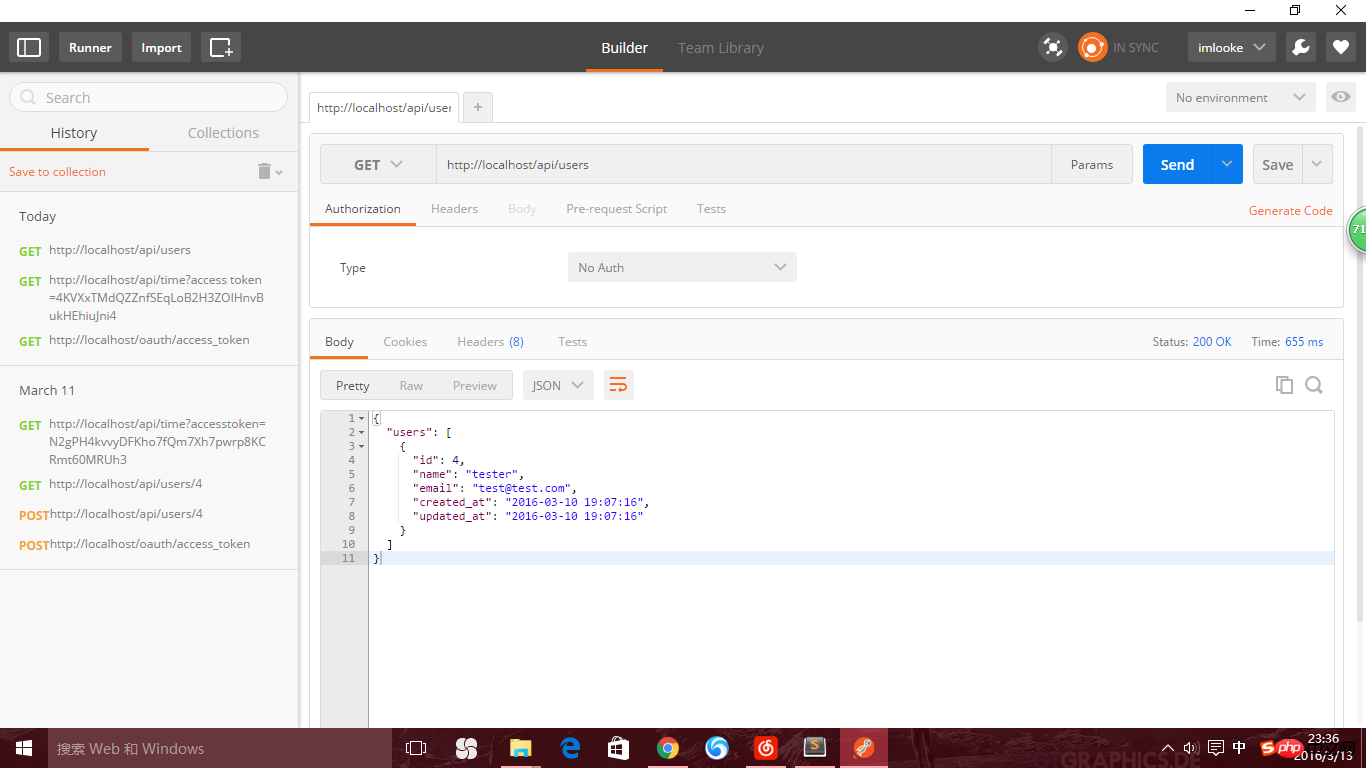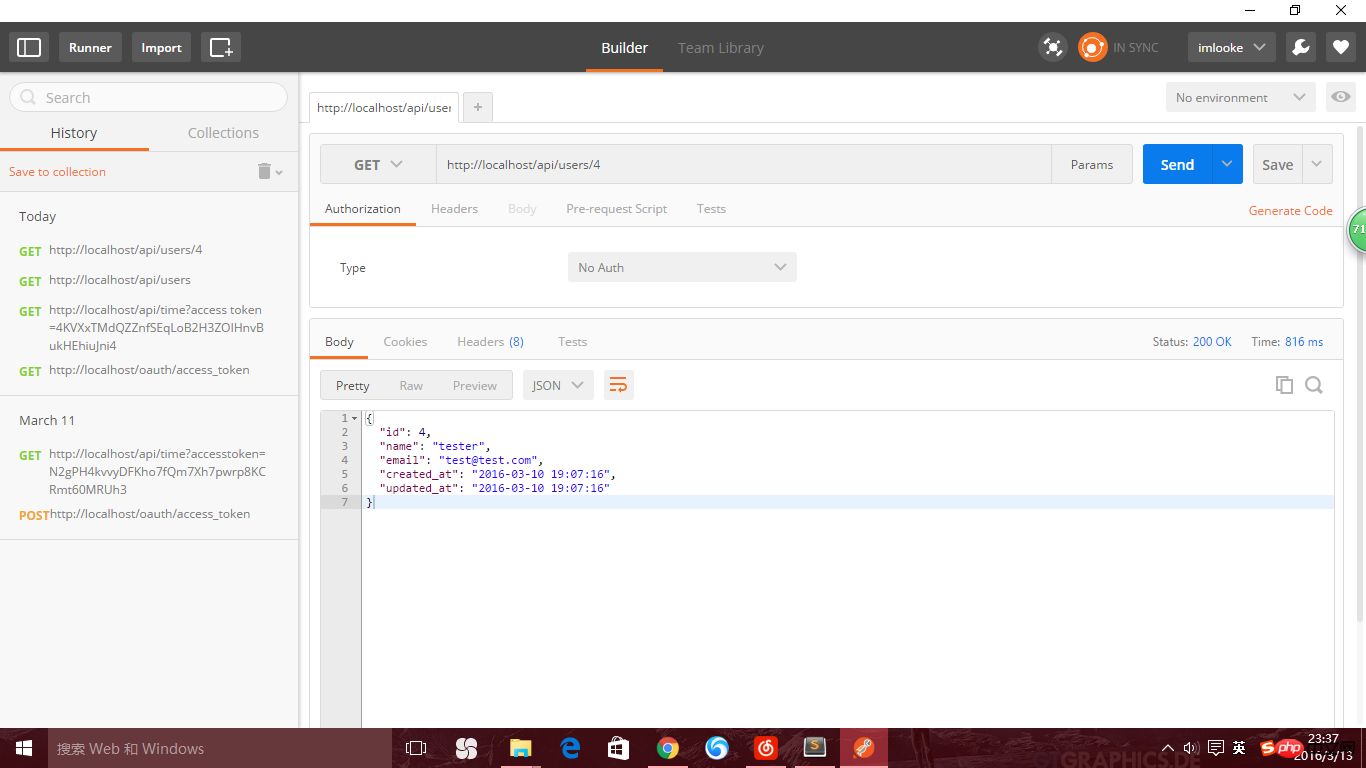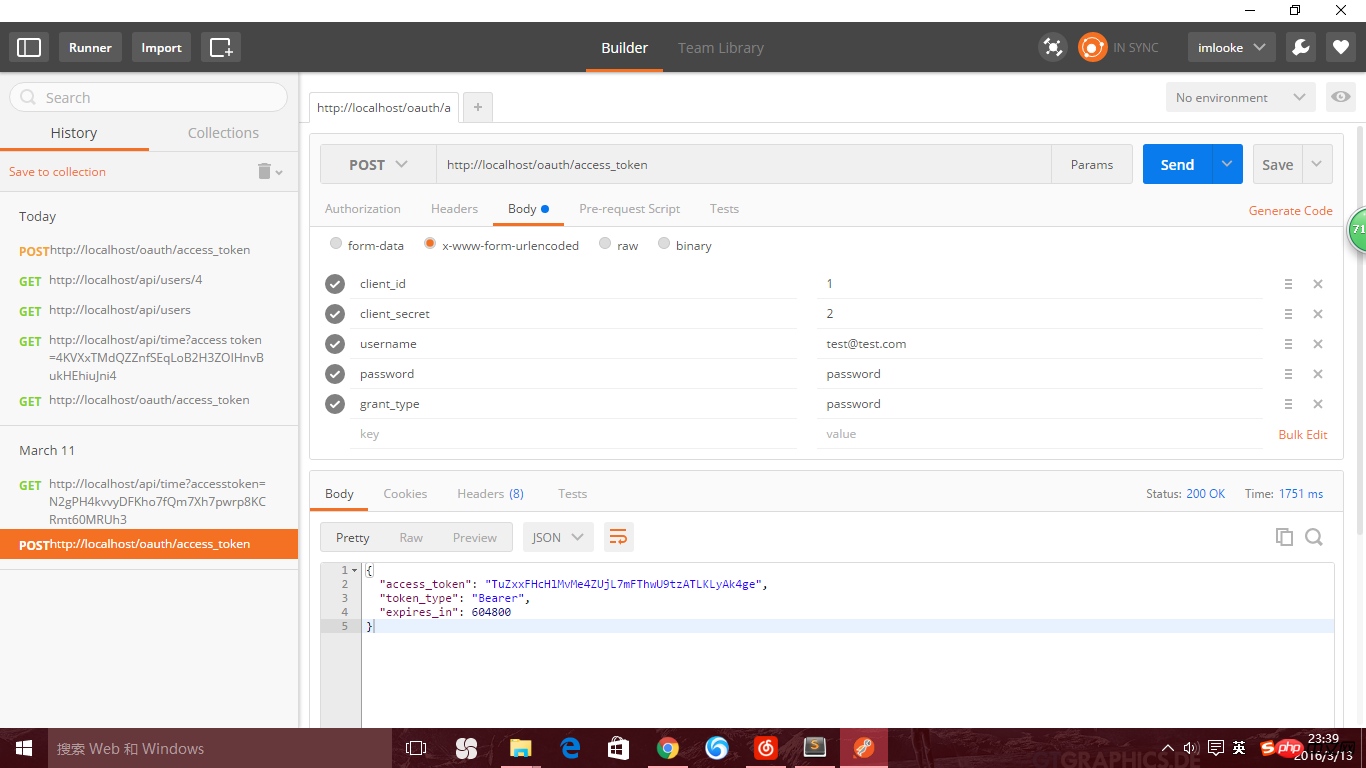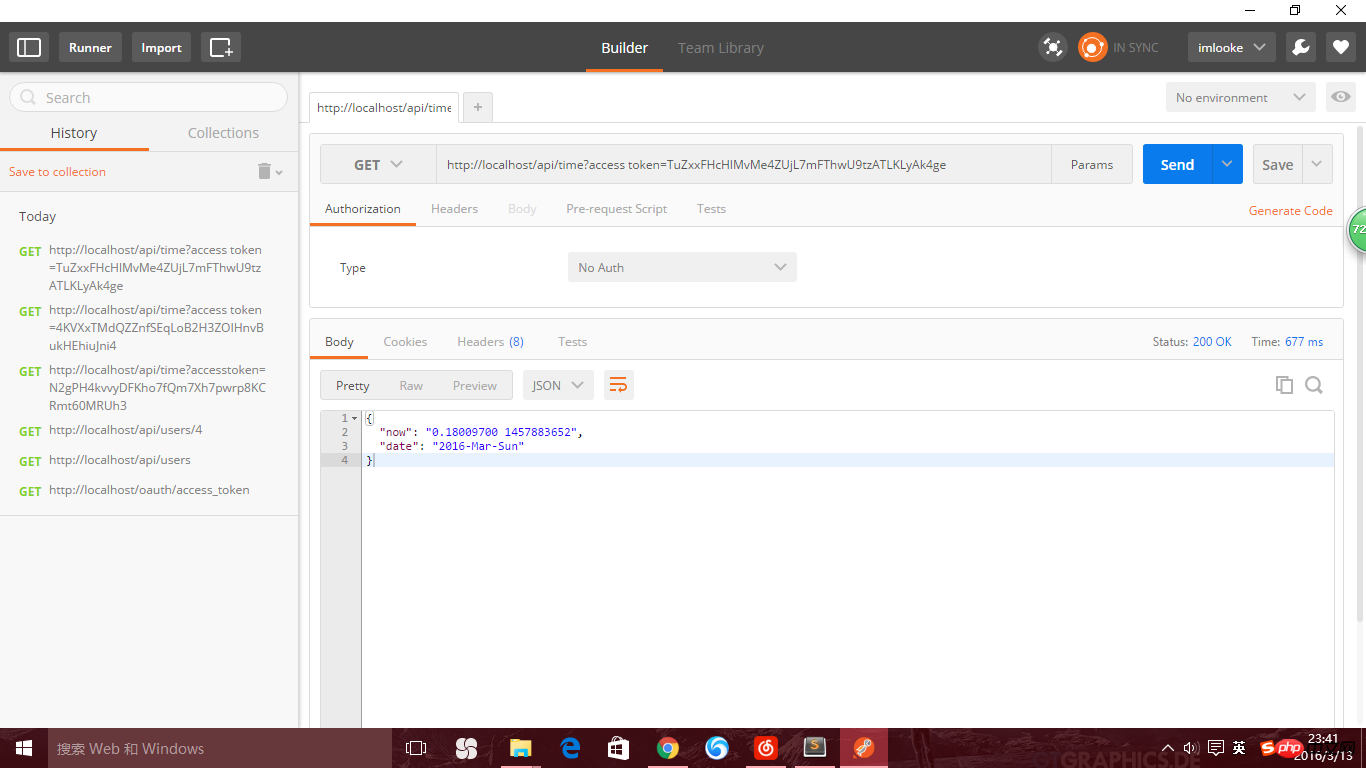本文主要介紹了基於laravel製作APP介面(API)的相關資料,需要的朋友可以參考下。希望對大家有幫助。
前期準備
前言,為什麼做以及要做個啥
本人姓小名白,不折不扣程式設計屆小白一名,但是自從大一那會兒接觸到編程這件奇妙的事情,就完完全全的陷入的程序的世界。
這不,最近又開始折騰APP了,話說現在開發一款APP真是容易,只用JavaScript和一點點HTML+css技術就可以完成。但做APP的後台就不一樣了。開發了APP,想讓讀點資料進去,那我們就要去開發個後台了。
laravel框架,是我最喜歡的PHP框架了,沒有之一。去年就曾經用laravel寫了我的個人網站但粗糙程度讓我十分臉紅,好了不扯了,讓我們直接進入主題——先安裝laravel吧!
基礎環境設定
具體的步驟直接看文件吧laravel5.2安裝
我自己的環境是win10上面安裝了wampsrver2.5,但這裡值得好好注意一下,用wampsrver2.5了話,這幾個地方要改動一下。關於這個請看我的筆記點擊預覽
工具:sublime
瀏覽器:chrome(要用到的插件postman)
關於API
API(Application Programming Interface,應用程式介面)是一些預先定義的函數,目的是提供應用程式與開發人員基於某軟體或硬體得以存取一組例程的能力,而又無需存取原始碼,或理解內部工作機制的細節。
要注意的是:API有它的具體用途,我們應該要清楚它是乾啥的。存取API的時候應該輸入什麼。訪問過API過後應該得到什麼。
在開始設計API時,我們應該注意這8點
這裡的內容摘抄自大神的博客
後續的開發計劃就圍繞著這個進行了。 (真心好棒的總結)
1.Restful設計原則
2.API的命名
3.API的安全性
4.API回傳資料
5.圖片的處理
6.傳回的提示訊息
7.線上API測試文件
8.app啟動時,呼叫一個初始化API以取得必要的資訊
用laravel開發API
就在我上愁著要不要從零開始學習的時候,找到了這個外掛dingo/api那麼現在就來安裝吧!
首先一定是下載的沒錯
在新安裝好的laravel的composer.json加入如下內容
然後開啟cmd執行
composer update
在config/app.php中的providers裡加入
App\Providers\OAuthServiceProvider::class, Dingo\Api\Provider\LaravelServiceProvider::class, LucaDegasperi\OAuth2Server\Storage\FluentStorageServiceProvider::class, LucaDegasperi\OAuth2Server\OAuth2ServerServiceProvider::class,
在aliases裡加入
'Authorizer' => LucaDegasperi\OAuth2Server\Facades\Authorizer::class,
修改app/Http/Kernel.php檔案裡的內容
protected $middleware = [\LucaDegasperi\OAuth2Server\Middleware\OAuthExceptionHandlerMiddleware::class, ]; protected $routeMiddleware = [ 'oauth' => \LucaDegasperi\OAuth2Server\Middleware\OAuthMiddleware::class, 'oauth-user' => \LucaDegasperi\OAuth2Server\Middleware\OAuthUserOwnerMiddleware::class, 'oauth-client' => \LucaDegasperi\OAuth2Server\Middleware\OAuthClientOwnerMiddleware::class, 'check-authorization-params' => \LucaDegasperi\OAuth2Server\Middleware\CheckAuthCodeRequestMiddleware::class, 'csrf' => \App\Http\Middleware\VerifyCsrfToken::class, ];
然後執行
php artisan vendor:publish php artisan migrate
在.env檔案裡加入這些設定
API_STANDARDS_TREE=x
API_SUBTYPE=rest
API_NAME=REST
API_PREFIX =api
API_VERSION=v1
API_CONDITIONAL_REQUEST=true
API_STRICT=false
API_DEBUG=true
API_DEFAULT_FORMAT=json
修改appconfig\oauth2.php檔案檔案檔案檔案
'grant_types' => [
'password' => [
'class' => 'League\OAuth2\Server\Grant\PasswordGrant',
'access_token_ttl' => 604800,
'callback' => '\App\Http\Controllers\Auth\PasswordGrantVerifier@verify',
],
],新建一個服務提供者,在app/Providers下新建OAuthServiceProvider.php檔案內容如下
namespace App\Providers;
use Dingo\Api\Auth\Auth;
use Dingo\Api\Auth\Provider\OAuth2;
use Illuminate\Support\ServiceProvider;
class OAuthServiceProvider extends ServiceProvider
{
public function boot()
{
$this->app[Auth::class]->extend('oauth', function ($app) {
$provider = new OAuth2($app['oauth2-server.authorizer']->getChecker());
$provider->setUserResolver(function ($id) {
// Logic to return a user by their ID.
});
$provider->setClientResolver(function ($id) {
// Logic to return a client by their ID.
});
return $provider;
});
}
public function register()
{
//
}
}然後開啟routes.php新增相關路由
//Get access_token
Route::post('oauth/access_token', function() {
return Response::json(Authorizer::issueAccessToken());
});
//Create a test user, you don't need this if you already have.
Route::get('/register',function(){
$user = new App\User();
$user->name="tester";
$user->email="test@test.com";
$user->password = \Illuminate\Support\Facades\Hash::make("password");
$user->save();
});
$api = app('Dingo\Api\Routing\Router');
//Show user info via restful service.
$api->version('v1', ['namespace' => 'App\Http\Controllers'], function ($api) {
$api->get('users', 'UsersController@index');
$api->get('users/{id}', 'UsersController@show');
});
//Just a test with auth check.
$api->version('v1', ['middleware' => 'api.auth'] , function ($api) {
$api->get('time', function () {
return ['now' => microtime(), 'date' => date('Y-M-D',time())];
});
});分別建立BaseController .php和UsersController.php內容如下
//BaseController
namespace App\Http\Controllers;
use Dingo\Api\Routing\Helpers;
use Illuminate\Routing\Controller;
class BaseController extends Controller
{
use Helpers;
}
//UsersController
namespace App\Http\Controllers;
use App\User;
use App\Http\Controllers\Controller;
class UsersController extends BaseController
{
public function index()
{
return User::all();
}
public function show($id)
{
$user = User::findOrFail($id);
// 数组形式
return $this->response->array($user->toArray());
}
}隨後在app/Http/Controllers/Auth/下建立PasswordGrantVerifier.php內容如下
namespace App\Http\Controllers\Auth;
use Illuminate\Support\Facades\Auth;
class PasswordGrantVerifier
{
public function verify($username, $password)
{
$credentials = [
'email' => $username,
'password' => $password,
];
if (Auth::once($credentials)) {
return Auth::user()->id;
}
return false;
}
}#開啟資料庫的oauth_client表新增一條client資料
INSERT INTO 'oauth_clients' ('id', 'secret', 'name', 'created_at', 'updated_at') VALUES ('1', '2', 'Main website', '2016–03–13 23:00:00', '0000–00–00 00:00:00');
接著的就是去愉快的測試了,這裡要測試的API有
#新增一個使用者
http://localhost/register
讀取所有使用者資訊
http://localhost/api/users
#只回傳用戶id為4的資訊
#http ://localhost/api/users/4
取得access_token
#http://localhost/oauth/access_token




以上是laravel編寫APP介面(API)的詳細內容。更多資訊請關注PHP中文網其他相關文章!




